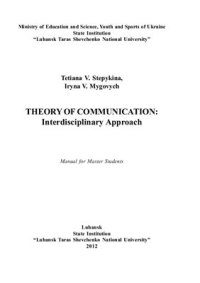
Ebook: Theory of Communication: Interdisciplinary Approach
Author: Stepykina T.V. Mygovych I.V.
- Genre: Science (General)
- Tags: Междисциплинарные материалы, Теория коммуникации
- Language: English
- pdf
Навчальний посібник для студентів магістратури ВНЗ (англ. мовою). — Луганськ: Вид-во "ЛНУ імені Тараса Шевченка", 2012. — 448 с.
Перевод выходных данных на английский язык: Luhansk: LTSNUPress, 2012. — 448 p.The manual "Theory of Communication: Interdisciplinary Approach" is written in need to provide a guidance in theory of language and cross-cultural communication for advanced students of major English. It attempts an overview of Communicative as well as Contact Linguistics in a synchronic perspective. The main purpose of the manual – to investigate the nature of language and culture as the basic means of interpersonal and intercultural communication. It is also aimed at studying the interdependence of a human being and language as a complex mental and sociocultural construct, the various ways in which language is used among the representatives of different sociocultural communities.
Thus, the final purpose of this manual is to help students develop basic communicative skills, increase effectiveness in individual or collective intercultural situations. It also focuses on studying the ways of overcoming psychological barriers occurring in intercultural interaction. A system of elementary trainings and tasks will serve as tools for achieving the aim.The topics covered in the book include:
the nature of interpersonal language communication;
the impact of social factors on language communication;
language contact and language change;
the relationship of language to culture and thought;
the reflection on cultural differences between the native and target cultures;
the influence of culture on human behavior, world perception, value system, personal life and professional growth;
the essence of four basic components of intercultural communication: culture, communication, context and power;
factors that contribute to the dynamics if intercultural communication: identity, language and non-verbal codes;
cross-cultural notions of identity (religious identity and multicultural identity);
non-verbal codes and cultural spaces;
intercultural transitions, stages of adaptation to new settings;
international migration and its effects on intercultural communication;
the nature of intercultural conflicts; cross-cultural differences in conflict orientations; mediation;
motivation and the difficulties in achieving effective intercultural communication;
components of intercultural competence; culture shock;
application of knowledge about intercultural communication.
Перевод выходных данных на английский язык: Luhansk: LTSNUPress, 2012. — 448 p.The manual "Theory of Communication: Interdisciplinary Approach" is written in need to provide a guidance in theory of language and cross-cultural communication for advanced students of major English. It attempts an overview of Communicative as well as Contact Linguistics in a synchronic perspective. The main purpose of the manual – to investigate the nature of language and culture as the basic means of interpersonal and intercultural communication. It is also aimed at studying the interdependence of a human being and language as a complex mental and sociocultural construct, the various ways in which language is used among the representatives of different sociocultural communities.
Thus, the final purpose of this manual is to help students develop basic communicative skills, increase effectiveness in individual or collective intercultural situations. It also focuses on studying the ways of overcoming psychological barriers occurring in intercultural interaction. A system of elementary trainings and tasks will serve as tools for achieving the aim.The topics covered in the book include:
the nature of interpersonal language communication;
the impact of social factors on language communication;
language contact and language change;
the relationship of language to culture and thought;
the reflection on cultural differences between the native and target cultures;
the influence of culture on human behavior, world perception, value system, personal life and professional growth;
the essence of four basic components of intercultural communication: culture, communication, context and power;
factors that contribute to the dynamics if intercultural communication: identity, language and non-verbal codes;
cross-cultural notions of identity (religious identity and multicultural identity);
non-verbal codes and cultural spaces;
intercultural transitions, stages of adaptation to new settings;
international migration and its effects on intercultural communication;
the nature of intercultural conflicts; cross-cultural differences in conflict orientations; mediation;
motivation and the difficulties in achieving effective intercultural communication;
components of intercultural competence; culture shock;
application of knowledge about intercultural communication.
Download the book Theory of Communication: Interdisciplinary Approach for free or read online
Continue reading on any device:

Last viewed books
Related books
{related-news}
Comments (0)